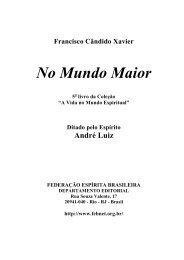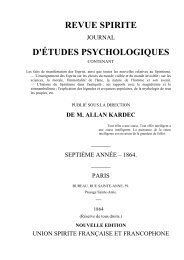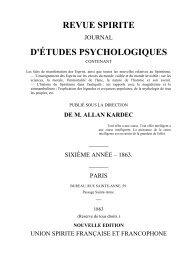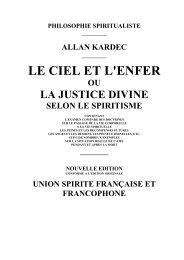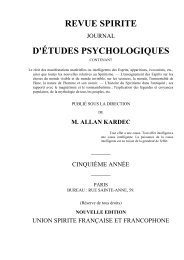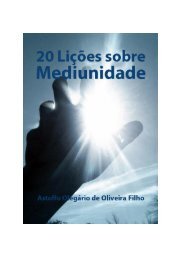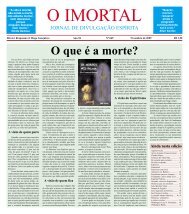PDF version - Geae
PDF version - Geae
PDF version - Geae
Create successful ePaper yourself
Turn your PDF publications into a flip-book with our unique Google optimized e-Paper software.
inclined to regard these childish utterances with inquietude, and to silence them. Science in this way loses<br />
valuable material. If the child, trying to translate in its confused language the fugitive vibrations of its psychic<br />
brain, were encouraged and questioned, one could obtain interesting indications of past lives. In the Orient this<br />
is done frequently. In the Daily Mail London, copied into the Matin, 8th July 1903, a case is related of a child<br />
at Simla who remembered that he was assassinated in 1814. His name was Mr. Tucker, and he was<br />
Superintendent of the Council. The child recalled even small incidents of that life and, taken to the place where<br />
the assassination occurred, was terror-stricken. In 1880 at Vera Cruz, a seven-year-old child possessed the<br />
power to heal. Several people were healed by vegetable remedies prescribed by the child. When asked how he<br />
knew theses things, he said he was once a great doctor, and his name was Jules Alpherese. This surprising<br />
faculty developed in him at the age of four. When alone with his parents he said: ‘Father, you must not think I<br />
will stay long with you. I am only here for a little while, then I must go away.’ When asked where he would<br />
go, he replied, “Far away where it is much better.’ He died a few years later.<br />
These cases of children who recall past lives could be enumerated indefinitely. The magazine Filosofia<br />
della Scienze, published in Palermo, January 1911, an interesting case, and the Annals of Psychical Science of<br />
July 1913 have another.<br />
Meantime, memory of the past lives does not seem desirable for the majority of men: on the contrary,<br />
it seems indispensable to their advancement that former existences should be effaced from their memory<br />
momentarily. The persistence of such memories would lead to the persistence of erroneous ideas and<br />
prejudices of caste, of former times and environments - in a word, of all mental heritage which would be the<br />
more difficult to modify and transform if still living in us.<br />
Forgetfulness permits us to profit by the different conditions we find in a new life, and aids us to<br />
construct our personality on a better plan, while our faculties gain in depth and extent by our experiences.<br />
Then, too, the recollection of a past soiled and sinful, as must be the case with most of us, would be a heavy<br />
burden to carry. The will must be well tempered before we can see without giddiness a long series of faults<br />
and follies, and even crimes, unroll before us, with all their consequences. The memories of past lives are only<br />
profitable to a spirit sufficiently evolved, sufficiently master of itself, to bear the burden without weakening,<br />
and sufficiently detached from earthly things to contemplate with serenity the spectacle of its history: to<br />
relieve the pains endured, the injustice suffered, and the anguish of betrayal by those if loved. It is a sorrowful<br />
privilege to know a vanished past of tears and blood: it is a cause of moral torture and interior wounds. If our<br />
former lives have been happy, the comparison with our often bitter present conditions would be almost<br />
insupportable.<br />
How many things would we not now efface from our actual lives which are obstacle to our interior<br />
peace and hindrances to our liberty! Why add to these the perspective of centuries? All that is important to<br />
carry with us are the fruits of the past - that is, the capacities acquired. They are the instruments of labor; the<br />
means of action for the spirit. It is all which constitutes character, this ensemble of virtues and faults - of tastes<br />
and aspirations; all this which flows from the subconsciousness to the normal consciousness. The recollection<br />
of vanished lives would present formidable inconveniences, not only to individuals but to collective society. It<br />
would introduce discord and ferment hate and hinder progress. All the criminals of history, reincarnated for<br />
expiation, would be unmasked! The terrors and iniquities of past centuries would be newly spread before our<br />
eyes. The accusing past would again cause profound, keen suffering. Man has come back to earth to develop<br />
his faculties and to conquer new merits, and he should look ahead, not behind. The future opens before him<br />
full of promise, and the great law commands him to advance resolutely; to render the journey easier, and to<br />
free him from all restraint, it casts a veil upon his past. Let us thank the infinite powers which, by lifting the<br />
crushing load of memories, has made the ascension easier and the reparation less bitter.<br />
Sometimes the objection is made that it is unjust to punish a man for a forgotten error. One said to me,<br />
‘The justice which moves in secret, and does not permit us to judge ourselves, should be considered an<br />
iniquity’. But is not all life a secret to us? The grass which sprouts, the wind that blows, the life which stirs, the<br />
stars that glisten in the night silently, all, all are mysteries. If we can only believe in the things we understand,<br />
in what will we believe? If a criminal condemned by human laws falls ill and loses his memory, does it follow<br />
that all consequences of his acts and all his responsibility vanish at the same time with his memory? No power<br />
could wipe away his past actions. All that we need to know here is the aim of life, and that divine justice<br />
governs the world. Each one is in the place he has made for himself, and nothing happens that is not merited.<br />
75



